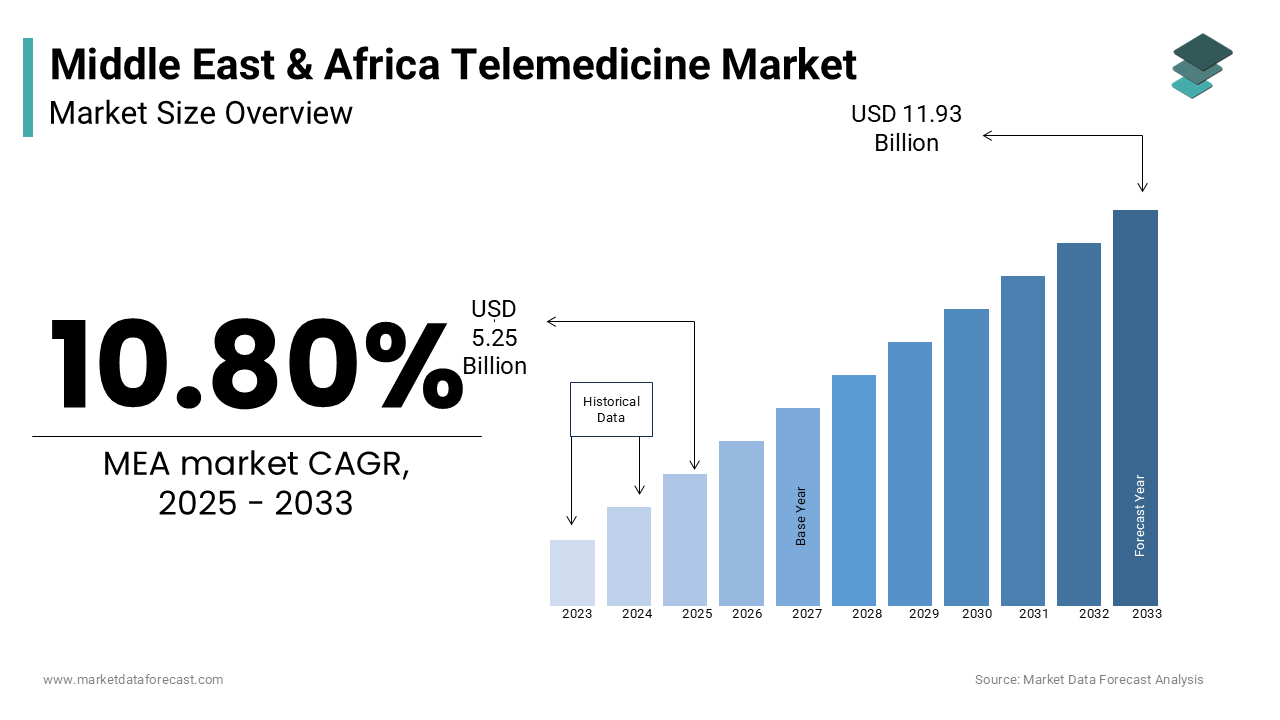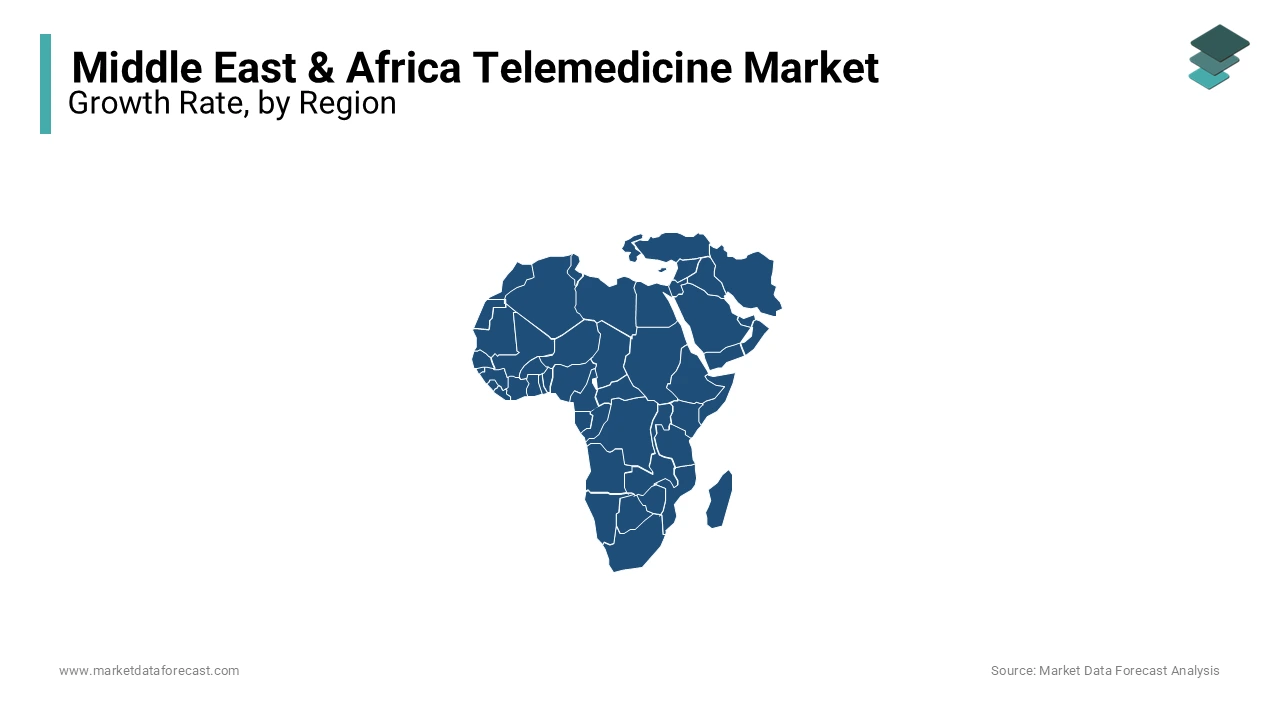Middle East & Africa Telemedicine Market Size, Share, Trends & Growth Forecast Report By Technology, Service, Application, Delivery Mode, End User & Country (KSA, UAE, Israel, rest of GCC countries, South Africa, Ethiopia, Kenya, Egypt, Sudan and Rest of MEA), Industry Analysis From 2025 to 2033
Middle East and Africa Telemedicine Market Size
The Middle East and Africa telemedicine market size was valued at USD 4.74 billion in 2024. The MEA market size is further estimated to grow from USD 5.25 billion in 2025 to USD 11.93 billion by 2033, with a CAGR of 10.80% over the next five years.

Though it is a small sector in the healthcare market presently, it is one of the fastest-growing sectors in the overall healthcare market. The recent healthcare reforms have transformed the telemedicine market and have been influential in expanding the reach of such applications.
MARKET DRIVERS
The growing patient count suffering from chronic diseases across the countries of MEA is boosting the usage of telemedicine and contributing to the growth of the MEA telemedicine market. Due to lifestyle changes, such as increasing consumption of unhealthy food, smoking, and drinking, the number of people diagnosed with various chronic diseases is growing rapidly and resulting in an increased mortality rate. As a result, the population in the region is focused on their health by using some of the home-based healthcare devices, and the data stored in these devices are sent to the healthcare provider for further treatment through telemedicine consultation. Some home-based medical devices are glucose meters, blood pressure monitors, ECG monitors, etc. According to a recent survey, nearly 73 million adults live with diabetes in the Middle East Africa region.
The rising adoption of digital health technologies by the population of the Middle East and Africa is another major factor promoting the growth of the telemedicine market in MEA. Due to increasing mobile phone usage and internet penetration, the population in the region is adopting telemedicine, which can be treated by sitting at home. In addition, increasing advancements in advanced software and applications help telemedicine and market development. Researchers focus on developing software with advanced technologies such as machine learning, artificial intelligence, etc. They also focus on increasing the options in the telemedicine software or applications to provide an easy interface to the users.
MARKET RESTRAINTS
Data security and privacy concerns are significant issues for telemedicine market growth in the Middle East and Africa. Smartphones using telemedicine applications may be prone to several threats due to viruses or third-party people. Lack of awareness about telemedicine among the population living in rural areas and illiterate people also hamper the market growth during the forecast period. Telemedicine requires skilled persons to operate devices. The dearth of skilled technicians is a major challenging factor for market growth. Lack of internet connection in rural areas and less awareness hinder MEA market growth.
REGIONAL ANALYSIS
Middle East and Africa held a moderate share of the global market in 2024 but is expected to grow at a steady CAGR during the forecast period owing to the increasing adoption of advanced healthcare technologies in the region. In this region, telemedicine plays a significant role in providing a safe way to deliver healthcare to all age groups at any time. The demand for telemedicine is increasing during and after the pandemic due to fear of the virus. Due to the increasing number of people suffering from various diseases, there is a burden in the healthcare sector that can be reduced and maintained by telemedicine technologies.

Egypt is one of the notable regional markets for telemedicine in MEA. The Egyptian telemedicine market is expected to register a healthy CAGR during the forecast period owing to the increasing number of programs regarding the benefits and use of telemedicine in Egypt. In addition, awareness programs are also conducted among healthcare providers and workers to enroll in the telemedicine application to provide treatment to the population living in distant areas from the hospitals.
Saudi Arabia is estimated to showcase prominent growth during the forecast period. In Saudi Arabia, the Ministry of Health has focused on developing telemedicine to provide affordable healthcare to all population groups by including healthcare insurance coverage by both public and private organizations. Ministry of Health also provides a free mobile application for healthcare consultation between patients and healthcare providers through video or audio. Saudi Arabia's government also instructs healthcare centers and hospitals to adopt telehealth solutions for those not living in remote locations. The government also conducted free training for healthcare providers about remote patient contact for treating patients remotely using digital technology.
UAE is also predicted to hold a considerable share of the MEA market during the forecast period. The telemedicine market growth in UAE is majorly aided by providing several services to the population in the region for better healthcare services. For example, in 2019, the Dubai Health Authority launched an intelligent service named 'Doctor for Every Citizen,' which provides free consultation through voice and video calls 24/7.
KEY MARKET PLAYERS
Companies dominating the MEA Telemedicine Market are AMD Global Telemedicine, CISCO Systems, Inc., Medtronic, Inc., GE Healthcare, Honeywell Lifesciences, Philips Healthcare, McKesson Corp, Aerotel Medical Systems, CardioComm, and Cerner Corporation.
MARKET SEGMENTATION
This research report on the MEA telemedicine market has been segmented and sub-segmented into the following categories.
By Type
- Technology
- Hardware
- Software
- Telecommunications
- Service
- Remote Patient Monitoring
- Store-and-Forward
- Real-Time Interactive
By Application
- Tele-Cardiology
- Tele-Radiology
- Tele-Pathology
- Tele-Dermatology
- Tele-Neurology
- Emergency Care
- Home Health
- Others
By Delivery Mode
- Web-Based
- Cloud-Based
- Others
By End-Users
- Tele-Hospitals
- Tele-Homes
- Others
By Country
- KSA
- UAE
- Israel
- Rest Of GCC Countries
- South Africa
- Ethiopia
- Kenya
- Egypt
- Sudan
- Rest Of MEA
Frequently Asked Questions
Which countries contribute significantly to the telemedicine market share in the Middle East?
Countries such as Saudi Arabia, the UAE, and Israel are among the leading contributors to the telemedicine market in the Middle East.
What are the key drivers fueling the growth of telemedicine in Africa?
Increased mobile connectivity, rising healthcare awareness, and efforts to bridge rural-urban healthcare gaps are key factors driving telemedicine growth in Africa.
How has the COVID-19 pandemic impacted the telemedicine trends in the Middle East?
The COVID-19 pandemic has accelerated the adoption of telemedicine in the Middle East, with a significant increase in virtual consultations and remote patient monitoring.
Related Reports
Access the study in MULTIPLE FORMATS
Purchase options starting from
$ 1600
Didn’t find what you’re looking for?
TALK TO OUR ANALYST TEAM
Need something within your budget?
NO WORRIES! WE GOT YOU COVERED!
Call us on: +1 888 702 9696 (U.S Toll Free)
Write to us: sales@marketdataforecast.com
